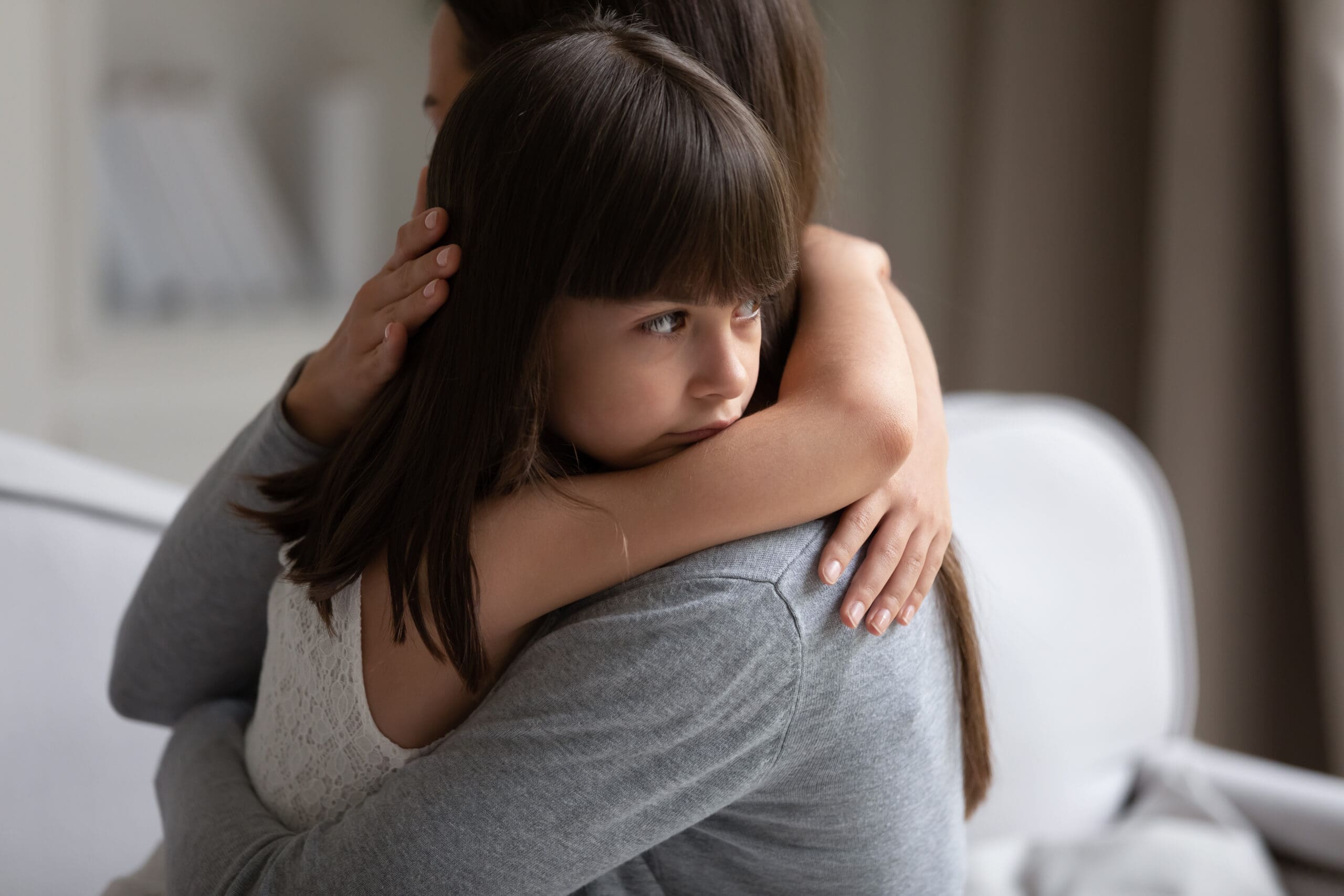Do You Lean On Your Kids Too Much For Emotional Support?
Finding the balance to handle your own painful emotions

Few are fortunate enough to be geographically close to family and have a robust parenting support network to lean on. Raising children, in the United States in particular, can be a very lonely experience. And now, in the midst of a global pandemic, parents everywhere are burned out. We’re overwhelmed and over-stretched with more responsibilities and less time, support and resources. The added layer of the pandemic has put us in a pressure cooker, so now we’re juggling remote working, virtual schooling and everything else it takes to run our homes, and being isolated and denied our usual stress relievers, which means that our levels of emotional and mental stress are only getting worse.
So when a parent is troubled or upset by something and is not always able to vent or communicate to their spouse (for instance, if their spouse is physically or emotionally unavailable for support, or is even the cause of the upset), or they can’t access their friends as easily as before, children can become sounding boards for their parents’ venting. Kids are naturally empathetic, so it can be easy for parents to unintentionally cross the line and seek emotional support from them.
This behavior of sometimes putting children into situations where they feel more like parents is often not intentional, and one could argue that reaching out to a child for love and support is harmless – after all, don’t we want to deepen our connection with our kids? Yes – of course! Isn’t that what every parent wants? We all aspire to be emotionally close with our kids, but it’s important to remember that we, the parents, are in charge.
Children shouldn’t be burdened with caring for the emotional well-being of their parents. Kids whose parents turn to them to fulfill their emotional needs can take on an unhealthy role – a combination of parent, therapist, and best friend. In households where one or both parents confide in their children about their problems, children can feel a heavy burden placed on them and they don’t know what to do with it.
Being forced to listen to their mother complain about their father, or their father talk to them about their financial problems can make children feel frightened to listen to things that are well beyond their ability to understand and are inappropriate for them to hear. Well-meaning parents may overshare what’s going on in their personal lives with their kids believing that they are strengthening their relationship, but they may not realize that they are burdening their children with unreasonable and inappropriate expectations, such as:
- Listening to a parent talk about their problems (including spouse, work, friendship, money problems)
- Offering advice to their parent(s)
- Mediating between a parent and another family member
- Serving as a confidante to their parent(s)
- Providing emotional comfort and support to their parent(s)
Allah’s Messenger ﷺ said:
“Everyone of you is a guardian and is responsible for his charges. The ruler who has authority over people, is a guardian and is responsible for them; a man is a guardian of his family and is responsible for them; a woman is a guardian of her husband’s house and children and is responsible for them; a slave is a guardian of his master’s property and is responsible for it; so all of you are guardians and are responsible for your charges.” [Sahih al-Bukhari]
Growing up in such an emotionally dysfunctional environment can have long-term negative consequences on children. Rasul’Allah ﷺ has informed us that parents are charged with a responsibility to lead, guide and take care of their children. This includes both their physical and emotional needs.
Overstepping boundaries and sharing personal problems with children places an enormous emotional burden on them and is a form of parental neglect. Studies have shown that children and teenagers who have grown up with such blurred boundaries and unacceptable expectations may experience struggles with:
- Anxiety
- Depression
- Suicidal thoughts
- Compulsively overworking in order to fulfill responsibilities at school and at home
- Feelings of guilt and shame
- Unrelenting worry Social isolation
- Physical symptoms of anxiety and depression, such as stomach-aches and headaches.
Children who have been heavily burdened by their parents’ emotional needs can feel very lonely because they have no parent to turn to for help and guidance, and they lose out on the chance to experience their own childhood.
What do I need to do?
1. Establish and maintain healthy emotional boundaries
Creating healthy boundaries with your kids is key. Healthy boundaries may include being mindful of what and/or how much you share with your children.
Try your best to refrain from leaning on your child as an emotional support during challenging times, as this can create a high level of stress and pressure for your child. This may look like refraining from discussing certain topics that may lead to your child becoming an emotional support in a way that isn’t healthy for the parent-child relationship.
This issue is usually stressed upon when couples are divorcing for example, as this can damage the child’s relationship with the other parent.
2. Recognize when you need support and seek it from trusted adults.
As the parent/guardian, it’s important to try your best to establish a sense of safety and security, especially during times of uncertainty like COVID. However, this doesn’t mean that you shouldn’t seek help or support during challenging times.
If you are fearful of not wanting to burden your loved ones with your problems and therefore withhold all your stress and anxiety, you should know that you are simply surviving, and not thriving. When you don’t talk about your issues and problems, you can end up internalizing it, and sitting in silence can have far-reaching negative consequences for your health.
Mental Health is a stigma, and stigmas thrive on silence, so in order to combat them and get the help that we need, we need to reach out. Seek out a therapist, trusted scholar, or someone else who you know you can safely confide in and will have your best interests at heart.
3. Learn to recognize your own weaknesses and identify the areas you need to work on.
Self-awareness is the first step to your personal development journey, and is a crucial part of strengthening your emotional intelligence. Without a good understanding of yourself, it is very hard to improve, respond effectively to others, or take constructive criticism. It’s also important to recognize your strong points so that you stay positive – make a long list of your strengths and list 3 to 4 areas of improvement to keep you motivated.
4. Journal your emotions
Reflecting can give you some much needed perspective and it can help you realize that your struggles are not insurmountable.
5. Seek support from the Almighty swt
Turn to the only One who can really help improve your situation and your emotional state of mind. Making the effort to be mindful and present in your worship and in each moment can build the resilience and strength that you need to overcome. Be constant in maintaining your connection with Allah swt through Salah and the Qur’an. Make Tahajjud a priority – the dua made at tahajjud is like an arrow which does not miss its target. – Imam Ash-Shafi’i
The Messenger of Allah ﷺ said:
“Verily Allah the Almighty has laid down fara’id (religious obligations), so do not neglect them. He has set boundaries, so do not overstep them. He has prohibited some things, so do not violate them; about some things He was silent, out of compassion for you, not forgetfulness, so seek not after them.” [Hadith Nawawi]
To be clear, it’s not always a bad thing for a parent to talk to a child or teen about what they’re feeling, in age-appropriate ways. We have a responsibility to teach our children about emotional intelligence and the best way to do that is by modeling it. When we ourselves feel frustrated, angry, or sad it is extremely helpful to label what we are feeling and let our kids know, without going into detail about the circumstances that made us feel that way.
In the absence of such an education, our kids may feel confused or blame themselves, and grow to struggle with their emotions into adulthood. How we act in moments of stress and difficulty sits heavily on our children, and how we react when we encounter obstacles stays with them and becomes their model of how to behave when they face difficulty.
We need to be mindful that we are not looking to our children for help in coping with our own emotions – our kids should never feel that they are responsible for keeping us happy or our family safe. We have a responsibility to give our children the freedom to experience childhood without carrying our burdens.


